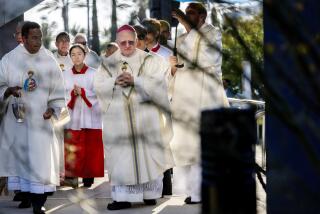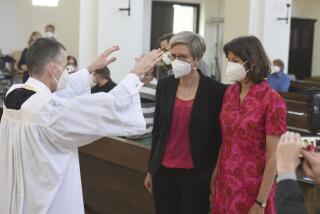Father Robert Nugent dies at 76; priest who supported gays, lesbians
- Share via
Father Robert Nugent, a Roman Catholic priest whose support of gays and lesbians in the church brought the Vatican’s censure, ending his public role as an advocate for reconciling church doctrines with the realities of gay life, died Wednesday in Milwaukee. He was 76.
The cause was cancer, said Sister Jeannine Gramick, the nun with whom he founded New Ways Ministry in 1977 to educate the church about gay and lesbian Catholics and advocate for their acceptance.
For more than two decades, Nugent traveled the country with Gramick to counsel gay Catholics, give workshops for Catholic clergy and lay people, and write books on gays in the church. But their Maryland-based organization quickly brought challenges from American Catholic authorities and the church hierarchy in Rome.
In 1984, Archbishop James A. Hickey of Washington ordered Nugent and Gramick out of the diocese and forced their resignations from New Ways Ministry.
They continued to speak and write about gays in the church, however, spurring the creation of a commission headed by Cardinal Adam Maida of Detroit to examine whether Nugent and Gramick were undermining church teachings on homosexuality.
That investigation was transferred in 1995 to the powerful Vatican office headed by Cardinal Joseph Ratzinger,, the conservative prelate who would become Pope Benedict XVI. His office concluded in 1999 that the American priest and nun had shown “ambiguities and errors” in their public statements about church doctrine regarding homosexuality. They were ordered to end their ministry and barred from holding office within their religious orders.
Nugent, who said he thought of himself as “a typical Irish Catholic priest,” accepted the silencing.
“He was really persecuted for the role he took,” said Marianne Duddy-Burke, executive director of the national advocacy group for gay Catholics, DignityUSA. “He believed strongly in a bridge-building ministry and felt church officials would learn so much if they would only listen and be open to the lives and stories of gay and lesbian people. He was a pivotal figure in our work.”
In the nearly four decades since Nugent and Gramick began ministering to gay and lesbian Catholics, attitudes have changed dramatically. Polls show a majority of American Catholics are open-minded about gay rights and same-sex marriage. According to New Ways Ministry, there are more than 200 gay-friendly parishes in the United States. In 1977, Gramick said in an interview, “there were none.”
Gramick had begun reaching out to gay Catholics in 1971 when she was a nun studying for a doctorate in mathematics at the University of Pennsylvania in Philadelphia. Nugent was working with the homeless in Philadelphia when he read a newspaper article about her work.
He wrote her a letter that ended with a casual offer of help.
“I didn’t mean it, and I’ve never said that again,” he told Associated Press in 1999, “because my life was changed radically.”
A few days after receiving Nugent’s letter, Gramick invited him to a meeting with gay Catholics. He found “people who loved the church very much,” he recalled. “But they felt like the church didn’t want them.”
He began working with Gramick even though he knew it could bring dire consequences. “We knew it was risky,” he told the St. Petersburg Times in 1999, “because Catholics weren’t talking and writing about sexuality.”
Among the books he wrote with Gramick were “Building Bridges: Gay and Lesbian Reality and the Catholic Church” (1992) and “Voices of Hope: A Collection of Positive Catholic Writings on Gay and Lesbian Issues” (1995), both published while they were under investigation by Catholic authorities.
When the inquiry passed to the Vatican, he and Gramick were asked several times to clarify their views in writing, but their responses were unsatisfying. In July 1999 they were summoned to Rome. Ratzinger reported that Gramick “simply refused to express any assent whatsoever to the teachings of the church on homosexuality” while Nugent was “responsive, but not unequivocal.”
Concluding that they had strayed from church teaching that all voluntary homosexual acts are “an intrinsic moral evil” and “gravely disordered,” the Vatican ordered them to cease their ministry to gay Catholics and their families. The following year, fed up with the criticism of its actions aired in the secular media, it ordered the two to stop discussing homosexuality in public and withdraw their support from a letter-writing campaign protesting their punishment.
Gramick ultimately chose not to comply and has continued to be a vocal advocate for gays in the church.
Nugent took a different approach. “Father Bob,” as he was known in his longtime parish at St. John the Baptist in New Freedom, Pa., counseled gay and lesbian Catholics privately and advised theologians and scholars working on issues of homosexuality. “He never gave up his commitment to lesbian and gay Catholics, although he had to give up his public work with them,” said Francis De Bernardo, executive director of New Ways Ministry.
When Nugent did speak publicly, his topic was silence.
He gave talks about “silent witnesses” such as Pierre Teilhard de Chardin, the Jesuit paleontologist who challenged church teachings on original sin and creation, and Thomas Merton, the Trappist monk who opposed the nuclear arms race as immoral and un-Christian. Both obeyed orders by their religious superiors to stop publicly discussing their unorthodox views but were eventually vindicated. Nugent wrote a 2011 book about them called “Silence Speaks.”
Gramick said Nugent prayed the Vatican would one day recognize the value of their ministry. Although that has not happened, he told her he was glad he would die under the papacy of Pope Francis, who has expressed a more welcoming stance toward gays in the church. “I think that gave Bob great consolation,” Gramick said.
Some in the gay community criticized him for staying in the church that so harshly rebuked him, but Nugent saw it differently.
“In order to have an effect on the house,” he told a college group in 2000, “you must live in it.”
Born in Norristown, Pa., in 1937, Nugent attended St. Charles Borromeo Seminary in Philadelphia. He earned master’s degrees in library science at Villanova University and in theology from Yale Divinity School.
A longtime cigar smoker, he was diagnosed with lung cancer shortly after retiring in June and moved to a healthcare facility in Milwaukee.
He is survived by a sister, nieces and nephews.
More to Read
Start your day right
Sign up for Essential California for the L.A. Times biggest news, features and recommendations in your inbox six days a week.
You may occasionally receive promotional content from the Los Angeles Times.







